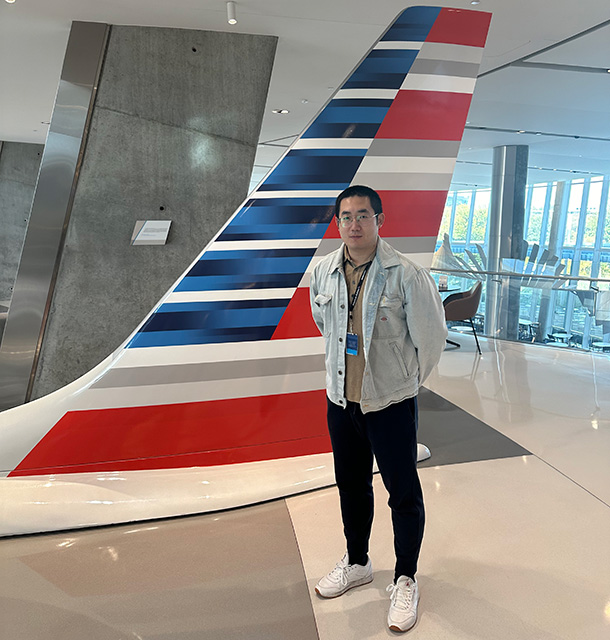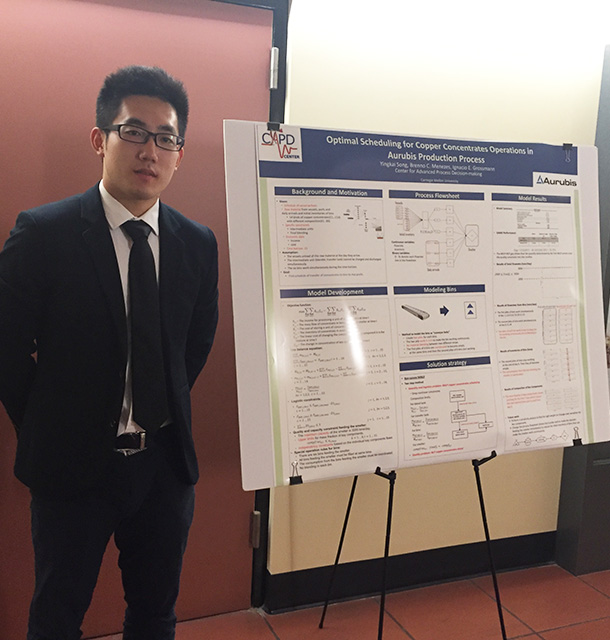Alum spotlight: Yingkai Song
Lauren Smith
Dec 17, 2024

Source: Yingkai Song
As a chemical engineer working in the aviation industry, Yingkai Song ('16) uses computational methods for decision-making. Song is an operations research consultant for American Airlines. He applies mathematical optimization to formulate and solve problems of flight scheduling, crew assignments, and other workforce planning.
The mathematical optimization theory and algorithms that Song learned while a master's student at Carnegie Mellon apply beyond chemical engineering. A typical scheduling problem in chemical engineering involves a set of jobs, a set of machines, and some demand constraints, like a delivery time limitation. A chemical engineer wants to find the optimal schedule for doing the job while satisfying the demand requirements and minimizing costs.
Scheduling problems in the aviation industry can be similarly formulated, with each flight like a job. The mathematical formulation underlying these problems is called mixed-integer programming. Song helps decision-makers determine when to fly, delay, or cancel certain flights while meeting customer demand. He also works on defining routes and determining which aircraft to send to which airport. The overall objective is typically minimizing costs incurred from flight delay and cancellation.
The scope of applications for chemical engineering domain knowledge is wider than Song realized when he first entered the field. Song chose to study chemical engineering because, with a bachelor's degree, he would be able to access a variety of well-paying jobs across the oil, chemical, and pharmaceutical industries.
As an undergraduate at China University of Petroleum, Song focused on petrochemicals. "Picture me working in a chemical lab, wearing a uniform and gloves and handling that black oil," he says.
The chemical engineering master's program at Carnegie Mellon gave him opportunities on the computational side. In his courses and in Ignacio Grossmann's research group, he was introduced to mathematical optimization theories.
An education in process systems engineering helped Song learn to think systematically. "You need to have an overview of the whole process, not just focus on one single operational unit. Then you can balance things out to achieve the overall goal," he says.

Source: Yingkai Song
Song's independent project was with the Enterprise-wide Optimization group of the Center for Advanced Process Decision-making. He was the first student working on a scheduling problem with Aurubis, a global copper company. Song helped to formalize the problem statement, and then he proposed a mathematical model of the process. "To our knowledge, at that time, this was the first mixed-integer nonlinear model for a scheduling problem in the copper industry," he says.
One of the reasons Song came to Carnegie Mellon's Department of Chemical Engineering is its longstanding reputation as a global leader in process systems engineering and operations research. He thought that the field of chemical engineering had adapted general methods from operations research, much like other industries have. He has realized that many ideas have flowed in the other direction, from chemical engineering to operations research. "A lot of algorithm methods and innovations in operations research started in chemical engineering," he says, "and the Department of Chemical Engineering at CMU is doing some very cool frontier research in mathematical optimization."
Song finished his master's degree feeling inspired to pursue a career in mathematical optimization and operations research. He completed a Ph.D. in chemical engineering at McMaster University and postdoctoral fellowships at Massachusetts Institute of Technology and Princeton University.
Song's graduate studies all focused on fundamental optimization theory and algorithms, rather than one specific chemical engineering application. "It helped me broaden my perspective. It also broadened my future job opportunities, because now I'm not restricted to the domain of chemical engineering," he says. In starting his career in industry, Song is excited to move from working with theory to the actual benefits he can bring to a company.
